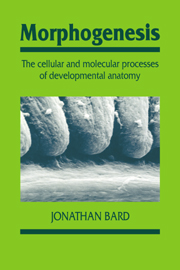Book contents
- Frontmatter
- Contents
- Preface to the paperback edition
- Preface to the hardback edition
- Acknowledgements
- Dedication
- 1 Introduction
- 2 Background
- 3 Case studies
- 4 The molecular basis of morphogenesis
- 5 The morphogenetic properties of mesenchyme
- 6 The epithelial repertoire
- 7 A dynamic framework for morphogenesis
- 8 Pulling together some threads
- Appendix 1 Supplementary references
- Appendix 2 The morphogenetic toolkit
- Appendix 3 Unanswered questions
- References
- Index
- Brief index of morphogenetic systems
3 - Case studies
Published online by Cambridge University Press: 15 December 2009
- Frontmatter
- Contents
- Preface to the paperback edition
- Preface to the hardback edition
- Acknowledgements
- Dedication
- 1 Introduction
- 2 Background
- 3 Case studies
- 4 The molecular basis of morphogenesis
- 5 The morphogenetic properties of mesenchyme
- 6 The epithelial repertoire
- 7 A dynamic framework for morphogenesis
- 8 Pulling together some threads
- Appendix 1 Supplementary references
- Appendix 2 The morphogenetic toolkit
- Appendix 3 Unanswered questions
- References
- Index
- Brief index of morphogenetic systems
Summary
Introduction
Solving or even understanding a morphogenetic problem requires that we first appreciate what is going on as the tissue forms. This, in turn, demands that we have good descriptions of the processes of organogenesis, for it is only by knowing what happens that we can pose questions about how it happens. It is from this basis of facts that one develops some feel for the subject and so can articulate particular problems and approach their solutions in ways that are likely to be successful. The purpose of this chapter is to do this for some well-known examples of morphogenesis and we will examine them at three levels of sophistication. We will then consider some general questions about the nature of the problems that have to be solved if we are to understand how structure arises in embryos.
At the coarsest level and to set the scene, we will start by taking a broad, morphogenetic overview of the appearance of the major organs in the amphibian embryo. Next, we will discuss three case studies and the examples have been selected partly because we know a great deal about them and partly because they illustrate some of the key cellular events taking place during embryogenesis. The first of these case studies is gastrulation in the sea-urchin embryo, chosen because it demonstrates a range of the properties that cells use in development.
- Type
- Chapter
- Information
- MorphogenesisThe Cellular and Molecular Processes of Developmental Anatomy, pp. 24 - 64Publisher: Cambridge University PressPrint publication year: 1990
- 1
- Cited by



